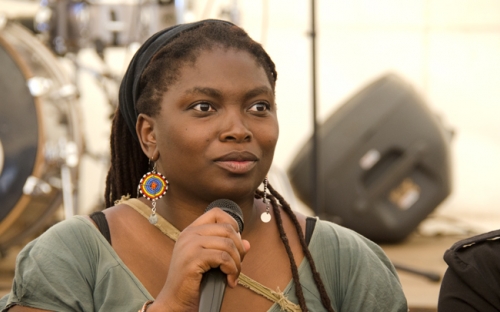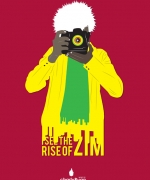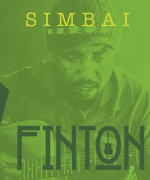The Language of Our Story
My grandmother used to tell stories. I remember how my family visits to the rural areas were enriched by the experiences of the stories she told us. After the evening meal, the grandchildren, would gather around her for story time. As the embers that had smouldered died down and she rekindled the fire, she would transport us to a time that even the T.V could not match. Then, there was a dearth of our own people’s stories on screen. I believe this was the first time I fell in love with the purest form of story. This love was only later cemented when story rescued me from teenage angst and the pains of growing through another form- poetry. This became an intimate relationship that I was only keen to share with myself before I discovered the art of performing poetry. The evening story times with my grandmother had shaped me. Not only did she tell us these stories and folklore, she would sometimes challenge us to tell stories that we had heard to the rest of the group.
On one of these occasions the circle went round and all the stories that I knew were told. In desperation, and in order to not lose face, I remixed an old folklore and re imagined it in the context of my modern experiences. Someone might say the experience of having my grandmother tell us stories influenced me because she used my native language, a language that held no barriers for me and no confusions, I don’t know. It certainly helped me that she spoke in a language I understood.
These memories were brought back to me when the other day, an older friend had a heated discussion with a younger man over using English as a young creative. My friend insisted that the young man was disenfranchising himself by using a language that he does not have much practice with in a bid to create rich and ground breaking hip hop music. He went on further to tell the young man that by using the English language he is pitting himself in a race with young people who have been creating in English from the moment they were born. He referenced West and East Afrikan musicians who use their native languages and have still gained popularity in the international market. In response the young man noted that there was no way he was not going to make his music using the English language when he, a product of the education system that makes millions like him, was schooled in English except for the Shona class which was one of 8 other subjects. That the cadence and rhythm of the Shona language itself is difficult to break into hip hop music’s style. The debate came to end with both parties agreeing on one notion; language is important but both were convinced on the importance of the points of view they held at the beginning of the discussion.
An often repeated question is: Why do these writers (e.g., Achebe, Rao, and Desai) write in English? Rao’s answer is: “Historically, this is how I am placed. I’m not interested in being a European but in being me. But the whole of the Indian tradition, as I see it, is in my work. There is an honesty in choosing English, an honesty in terms of history.”…
“The important thing is not what language one writes in, for language is really an accidental thing. What matters is the authenticity of experience, and this can generally be achieved in any language.” Braj B. Kachru, World Englishes: Agony and Ecstasy
Now the argument of native language versus borrowed language usage in the creation of products of literature read and performed is not new. In a bid to re-actualise self through the liberation of the mind, the Afrikan has been faced with the challenge of going back to her own heritage and dismiss the constraints of the residues of colonial customs; which included the colonial master’s language in favour of one’s mother tongue. The questions for us young Afrikan artists; do we express ourselves better in our native languages? Should we be doing our part in fighting against the extinction of our languages through the usage of these same in creating our artistic products? Are we losing ourselves by using foreign languages that come with their cultural connotations that are so different from our own? Can we effectively tell our stories hence our history through borrowed language?
“Trying to express one’s ideas even in one’s own language is difficult because what is said or written often is not exactly what one had in mind. Between the birth of the idea and its translation into words, something is lost. The process of expression is even more difficult in the second language of one’s own’ cultural group… In other words, until these writers and their western midwives accept the fact that any true Afrikan literature must be written in Afrikan languages, they would be merely pursuing a dead end, which can only lead to sterility, uncreativity, and frustration.”
Obiajunwa Wali, The dead end of Afrikan Literature
For some of us we think in our native languages and have to translate those into the borrowed language that does not fully articulate our essences, some things are lost in translation. For some of us we think in the borrowed language and speak the borrowed language, and we are totally disconnected from the everydayness of our existence because the borrowed cannot fully account for the complexity of our relationships and our connections to the elements around us. And for the other part of us, we don’t know the colour nor the language of our thoughts because we are still trying to figure out what or who speaks when we are silent, are these thoughts our own or just borrowed versions of the same view that the other has for us? Yet what is the push behind our language choices? Today in the Zimbabwean Poetry circuit we have more poets trying to prove their mettle using English than those who use Ndebele, Shona or any of their native languages.
“I took to the English language like a duck takes to water. I was therefore a keen accomplice and student in my own mental colonisation…For a black writer the language is very racist; You have to have harrowing fights and hair-raising panga duels with it before you can make it do all you want it to do. It is so for the feminist. English is very male. Hence feminist writers also adopt the same tactics. This may mean discarding grammar, throwing syntax out, subverting images from within, beating the drum and cymbals of rhythm, developing torture chambers of irony and sarcasm, gas ovens of limitless black resonance.”
Dambudzo Interviews himself, DAMBUDZO MARECHERA 4 June 1952-18 August 1987
Dambudzo Marechera in his writings defied the constraints of the English language by deforming it and its artistic forms to communicate a less narrowly defined postcolonial Afrikan position. Today many young writers hold him in a god like status, because of this feat and loosely because of the defiant lifestyle he led. Even some writers like Chenjerai Hove in his novel Bones managed to let the Shona tongue speak through English words but not necessarily the expressions of the language itself. These days we have Brian Chikwava continuing the quest to deform the English language with his novel Harare North. But what is the point of deforming a language instead of using one that we have already that does not try to exert its own domination on the narrator as well as the recipient. But do not think the same is not happening with our own native languages. Writers like Ignatius Mabasa have been in the recent past criticised for retelling Shona folklore splicing old Shona with colloquial Shona by Shona linguists. For them, language should exist in its purest form and the job of the writer and artist should work towards the preservation of the language. But for Ignatius it was a simple case of reaching to a young audience whose socialisation is far removed from the context of how those stories were told.
“The nondescript writer has little to tell us, anyway, so he might as well tell it in conventional language and get it over with. He is like a man offering a small, nondescript, routine sacrifice for which a chick, or less, will do. A serious writer must look for an animal whose blood can match the power of his offering.” Chinua Achebe, English and the Afrikan Writer
Our local TV station has the main news in English and our native languages are relegated to being the news before the main news. If critics are going to subscribe a language to a writer, to a performer should they not then subscribe that we be taught in our native languages that the borrowed language be done away with? Will there be room for us to communicate amongst ourselves? Poets like Madzitateguru, Godobori and Sithandazile Dube perform primarily in their native languages and they have garnered following from amongst their peers but in trying to penetrate the global market have also used English to have appeal with an English speaking market. One wonders then whether there is truth in all arguments to the story of language. My conclusion is this, if you can write in your native language, write and if you want to perform in your native language, you should but we should be wary of calls to cement our identity through something as singular as language, when it is there for us to break, piece together and communicate with. Language changes and adapts to the changes in our times. Whatever your language choice, your story is authentic because you tell it.





